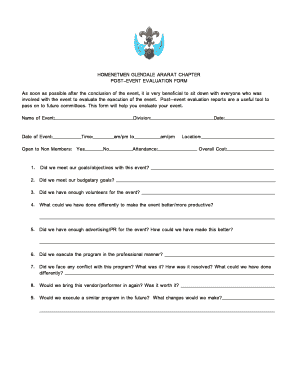Post-Event Evaluation: Learning from Every Occasion

Events are a significant investment for companies in the tech industry. Whether it’s a conference, seminar, trade show, or product launch, they provide an excellent platform to showcase new innovations, establish connections, build brand awareness, and learn from industry experts. However, organizing and executing a successful event is not the end of the journey. The real value lies in conducting a comprehensive post-event evaluation to assess its effectiveness and identify areas for improvement.
1. Setting Clear Objectives
Before diving into evaluating an event, it’s essential to have a set of measurable objectives established beforehand. These objectives should align with the overall business strategy, such as generating leads, increasing sales, or improving brand perception. By defining these goals, it becomes easier to assess the success or failure of an event against these predefined benchmarks.
2. Collecting and Analyzing Data
Data is the backbone of any evaluation process. Start collecting data during the event by observing attendee behavior, conducting surveys, and gathering feedback. Utilize technology tools like mobile apps or electronic badges to track attendee engagement and satisfaction. Additionally, analyze social media mentions, website traffic, and any other metrics that provide insights into the event’s reach and impact.
3. Measuring ROI
One of the critical metrics in evaluating any event is its return on investment (ROI). Calculate the actual financial returns against the cost of organizing and participating in the event. While the immediate impact may not always be quantifiable, consider the long-term benefits such as business partnerships, brand exposure, or lead generation that can be attributed to the event when assessing its ROI.
4. Analyzing Attendee Feedback
Attendee feedback is a goldmine of valuable insights. Send out post-event surveys to gather feedback on various aspects of the event, including organization, content, speakers, and overall experience. Pay attention to both quantitative data (ratings, rankings) and qualitative feedback (comments, suggestions) to understand attendees’ perspectives and identify areas for improvement in future events.
5. Assessing Speaker Performance
The speakers at an event play a crucial role in delivering valuable content and engaging the audience. Evaluate each speaker’s performance by reviewing attendee feedback, analyzing social media sentiment, and conducting post-event interviews. Consider factors such as clarity of presentation, expertise, relevance to the topic, and audience engagement when assessing the effectiveness of individual speakers.
6. Reviewing Logistics and Event Execution
Logistics and event execution can significantly impact attendees’ overall experience. Evaluate factors such as venue selection, audiovisual setup, registration process, and catering to identify any areas that may have hindered the event’s success. Review vendor contracts and assess their performance to ensure they met expectations and delivered services as agreed.
7. Identifying Successes and Shortcomings
Based on the data collected and analyzed, identify the event’s successes and shortcomings. Celebrate the achievements that align with objectives, such as an increase in positive brand sentiment or a high number of qualified leads generated. Conversely, use the identified shortcomings as learning opportunities to refine future event strategies and avoid repeating similar mistakes.
8. Leveraging Insights for Future Events
Lastly, ensure that the learnings from the post-event evaluation are implemented in future event planning and execution. Use the insights to refine objectives, enhance content selection, improve logistics, and employ efficient marketing strategies. By continuously learning from previous events, companies can elevate their event capabilities, maximize ROI, and create more impactful experiences for attendees.
Post-event evaluations are vital for companies in the tech industry to optimize their event strategies continually. By setting clear objectives, collecting and analyzing data, measuring ROI, and leveraging attendee feedback, companies can learn from each occasion and make informed decisions for future events. Remember, every event is an opportunity to grow and improve, so let post-event evaluations be a guiding light on your path to success.